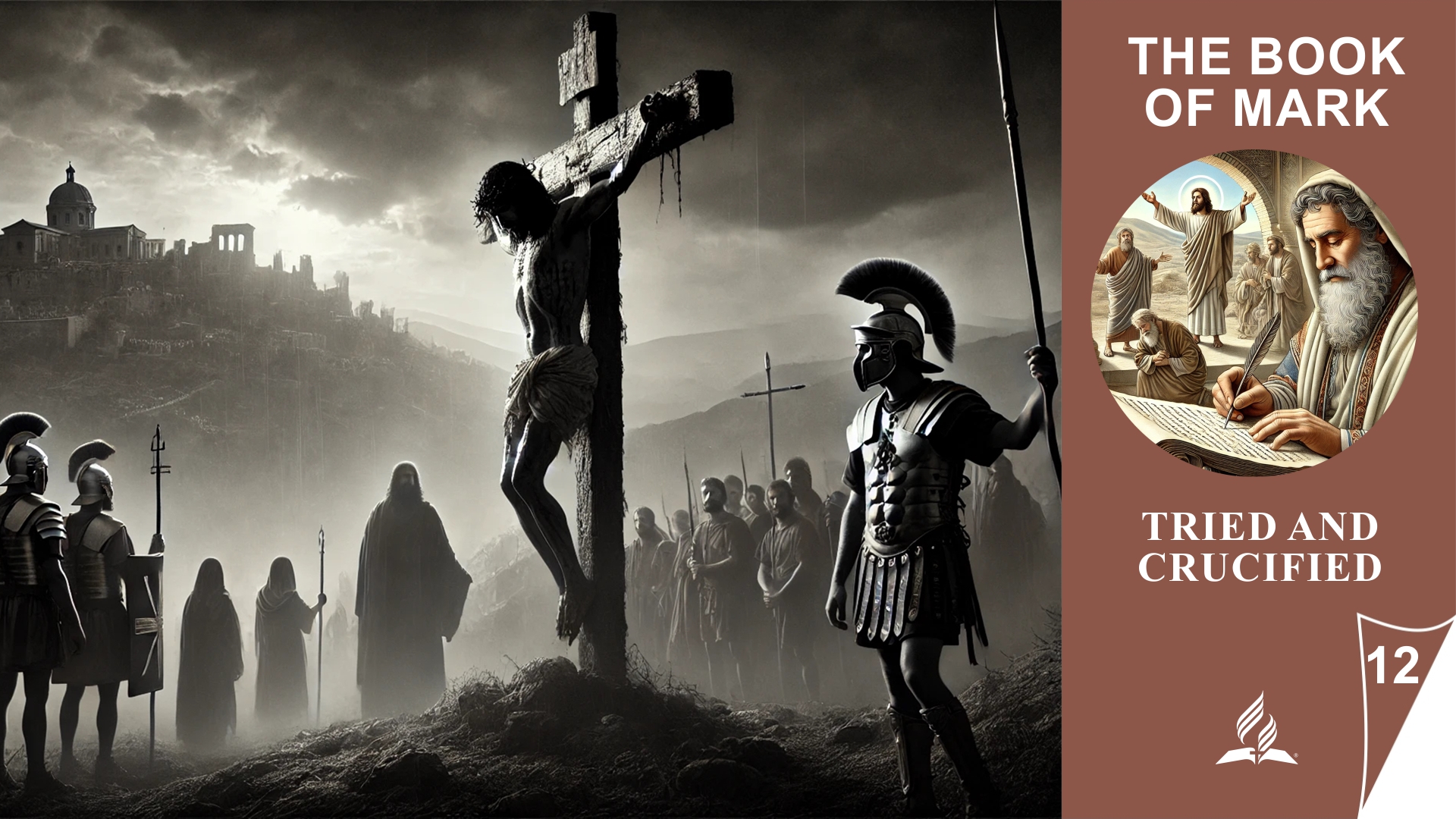September 17, 2024
DAILY BIBLE READING – Luke Chapter 5
1 And it came to pass, that, as the people pressed upon him to hear the word of God, he stood by the lake of Gennesaret,
2 And saw two ships standing by the lake: but the fishermen were gone out of them, and were washing their nets.
3 And he entered into one of the ships, which was Simon’s, and prayed him that he would thrust out a little from the land. And he sat down, and taught the people out of the ship.
4 Now when he had left speaking, he said unto Simon, Launch out into the deep, and let down your nets for a draught.
5 And Simon answering said unto him, Master, we have toiled all the night, and have taken nothing: nevertheless at thy word I will let down the net.
6 And when they had this done, they inclosed a great multitude of fishes: and their net brake.
7 And they beckoned unto their partners, which were in the other ship, that they should come and help them. And they came, and filled both the ships, so that they began to sink.
8 When Simon Peter saw it, he fell down at Jesus’ knees, saying, Depart from me; for I am a sinful man, O Lord.
9 For he was astonished, and all that were with him, at the draught of the fishes which they had taken:
10 And so was also James, and John, the sons of Zebedee, which were partners with Simon. And Jesus said unto Simon, Fear not; from henceforth thou shalt catch men.
11 And when they had brought their ships to land, they forsook all, and followed him.
12 And it came to pass, when he was in a certain city, behold a man full of leprosy: who seeing Jesus fell on his face, and besought him, saying, Lord, if thou wilt, thou canst make me clean.
13 And he put forth his hand, and touched him, saying, I will: be thou clean. And immediately the leprosy departed from him.
14 And he charged him to tell no man: but go, and shew thyself to the priest, and offer for thy cleansing, according as Moses commanded, for a testimony unto them.
15 But so much the more went there a fame abroad of him: and great multitudes came together to hear, and to be healed by him of their infirmities.
16 And he withdrew himself into the wilderness, and prayed.
17 And it came to pass on a certain day, as he was teaching, that there were Pharisees and doctors of the law sitting by, which were come out of every town of Galilee, and Judaea, and Jerusalem: and the power of the Lord was present to heal them.
18 And, behold, men brought in a bed a man which was taken with a palsy: and they sought means to bring him in, and to lay him before him.
19 And when they could not find by what way they might bring him in because of the multitude, they went upon the housetop, and let him down through the tiling with his couch into the midst before Jesus.
20 And when he saw their faith, he said unto him, Man, thy sins are forgiven thee.
21 And the scribes and the Pharisees began to reason, saying, Who is this which speaketh blasphemies? Who can forgive sins, but God alone?
22 But when Jesus perceived their thoughts, he answering said unto them, What reason ye in your hearts?
23 Whether is easier, to say, Thy sins be forgiven thee; or to say, Rise up and walk?
24 But that ye may know that the Son of man hath power upon earth to forgive sins, (he said unto the sick of the palsy,) I say unto thee, Arise, and take up thy couch, and go into thine house.
25 And immediately he rose up before them, and took up that whereon he lay, and departed to his own house, glorifying God.
26 And they were all amazed, and they glorified God, and were filled with fear, saying, We have seen strange things to day.
27 And after these things he went forth, and saw a publican, named Levi, sitting at the receipt of custom: and he said unto him, Follow me.
28 And he left all, rose up, and followed him.
29 And Levi made him a great feast in his own house: and there was a great company of publicans and of others that sat down with them.
30 But their scribes and Pharisees murmured against his disciples, saying, Why do ye eat and drink with publicans and sinners?
31 And Jesus answering said unto them, They that are whole need not a physician; but they that are sick.
32 I came not to call the righteous, but sinners to repentance.
33 And they said unto him, Why do the disciples of John fast often, and make prayers, and likewise the disciples of the Pharisees; but thine eat and drink?
34 And he said unto them, Can ye make the children of the bridechamber fast, while the bridegroom is with them?
35 But the days will come, when the bridegroom shall be taken away from them, and then shall they fast in those days.
36 And he spake also a parable unto them; No man putteth a piece of a new garment upon an old; if otherwise, then both the new maketh a rent, and the piece that was taken out of the new agreeth not with the old.
37 And no man putteth new wine into old bottles; else the new wine will burst the bottles, and be spilled, and the bottles shall perish.
38 But new wine must be put into new bottles; and both are preserved.
39 No man also having drunk old wine straightway desireth new: for he saith, The old is better.
King James Version. Public Domain
Commentary
Introduction:
Luke chapter 5 vividly demonstrates how Jesus calls people, heals them, and engages with them both in their distress and their sinfulness. This chapter emphasizes Jesus’ power and authority over nature, diseases, sin, and the religious system of that time. The account of Peter’s fishing expedition, the healing of the leper and the paralytic, and the calling of Levi are all examples of the transformative encounter with Christ that changes people’s lives and hearts.
Commentary:
The chapter begins with the remarkable event of Peter’s fishing expedition. Simon Peter, an experienced fisherman, has worked all night without catching anything. However, when Jesus instructs him to cast the nets again, he obeys reluctantly, even though his own experience tells him otherwise. This obedience to Jesus’ word leads to an overwhelming success. It becomes clear that divine action surpasses human effort when one trusts in God. Peter’s reaction—the acknowledgment of his own sinfulness—shows that genuine encounters with God’s power often lead to the realization of one’s own inadequacy. Yet Jesus reassures Peter with the words, “Do not be afraid!” because he is now called to gather people for the kingdom of God.
The healing of the leper and the paralytic reveals Jesus’ compassion and authority. Both miracles illustrate that Jesus not only brings physical healing but also has the power to forgive sins—a central truth that causes the Pharisees to doubt him. However, through his actions, Jesus proves that he is indeed the promised Messiah who can forgive sins.
The calling of the tax collector Levi further demonstrates Jesus’ willingness to reach out to the marginalized. The religious leaders criticize Jesus for associating with sinners and tax collectors, but Jesus makes it clear that he has come to call those who are aware of their sinfulness. His parable of new wine in old wineskins illustrates that the kingdom of God and Jesus’ teachings do not simply fit into the old, rigid religious traditions. It requires renewal and openness to the new.
Summary:
Luke chapter 5 shows how Jesus encounters and transforms people. Through Peter’s fishing expedition, we learn about the power of obedience to God’s word. In the healings and the calling of Levi, it becomes clear that Jesus not only provides physical healing but also forgives sins and invites outsiders to be part of his kingdom. The chapter concludes with a parable that emphasizes the need for renewal and the acceptance of the new in God’s plan.
![]()

WEEKLY SPIRIT OF PROPHECY READING – Ellen White | The Desire of Ages
Chapter 63—“Thy King Cometh”
This chapter is based on Matthew 21:1-11; Mark 11:1-10; Luke 19:29-44; John 12:12-19.
Read online here
Commentary
Introduction
Chapter 63 highlights the triumphant entry of Jesus into Jerusalem, based on the accounts from the Gospels of Matthew, Mark, Luke, and John. It represents the moment when Jesus is publicly recognized as the Messiah and the fulfillment of the Old Testament prophecy in Zechariah 9:9 becomes clear. The events are filled with jubilation, hope, and deep misunderstandings about the true nature of Jesus’ mission. The contrast between the people’s joy and Jesus’ personal sorrow over Jerusalem’s fate adds emotional depth to the narrative.
Commentary
The triumphant entry of Jesus into Jerusalem is a significant event that seamlessly aligns with the prophetic writings of the Old Testament. Zechariah 9:9 foretold the arrival of a humble king on a donkey, and this moment is now fully realized in its splendor. Jesus, who had long refused royal honors, now allows himself to be celebrated as the Messiah. This not only reveals his self-identification as King but also his conscious preparation for the forthcoming sacrifice.
The crowd accompanying Jesus is filled with great enthusiasm. They see him as an earthly deliverer who will overthrow Roman rule and restore the Kingdom of Israel. This misunderstanding illustrates how much the people failed to grasp the true nature of Jesus’ mission. They expected a political ruler, but Jesus’ kingdom was spiritual. While the crowd shouts “Hosanna,” Jesus feels deep sorrow, knowing the suffering that awaits both him and Jerusalem. This tension between the people’s joy and Jesus’ grief over the city’s hardened heart makes this passage so poignant.
Particularly significant is the moment when Jesus weeps over Jerusalem. Despite the jubilation surrounding him, he knows that the city will not accept the true salvation. The prediction of Jerusalem’s destruction and the symbolic meaning of this event are central to understanding Jesus’ mission: He came to save, but many rejected him.
Summary
Chapter 63 describes the triumphant entry of Jesus into Jerusalem, accompanied by the fulfillment of Zechariah’s prophecy about the coming Messiah. While the crowd rejoices in anticipation of an earthly king, Jesus is deeply moved as he foresees the suffering awaiting Jerusalem. His entry marks the beginning of the final phase of his life, in which he will offer himself as the Savior of the world. The events illustrate the contrast between the expectation of an earthly ruler and the true spiritual mission of Jesus as the Redeemer of humanity.

WEEKLY SPIRIT OF PROPHECY READING – Ellen White | The Desire of Ages
Chapter 64—A Doomed People
This chapter is based on Mark 11:11-14, 20, 21; Matthew 21:17-19.
Read online here
Commentary
Introduction
Chapter 64 is based on the accounts in Mark 11:11-14, 20-21 and Matthew 21:17-19. It describes the symbolic cursing of the barren fig tree by Jesus and places this act in the context of the spiritual condition of the people of Israel. The cursing serves as a sign of the consequences of hypocrisy and spiritual fruitlessness, and it is a warning to the Jewish people and all generations who reject God’s grace. Jesus speaks with sorrow about the future judgment of Jerusalem, which results from their rejection of the Messiah.
Commentary
The parable of the fig tree is central to this chapter. Jesus uses the barren fig tree as a symbol for the people of Israel, who outwardly appear devout but inwardly bear no true fruits of faith. The Jews in Jesus’ time presented an external appearance of deep religious life, with their magnificent temple and elaborate worship services. But like the fig tree, which bears only leaves, they lack inner fruit: righteousness, love, and mercy.
Jesus approaches the tree, seeking fruit, just as He came to His people seeking genuine fruit of faith. Instead, He finds only hypocrisy and self-righteousness. The cursing of the tree is a powerful symbol of the impending judgment on Jerusalem. The destruction of the fig tree illustrates the consequences of rejecting God’s grace.
This event not only illustrates the punishment for Israel but also serves as a warning for all time. Anyone who claims to serve God but produces no fruits of faith stands under the same judgment. God’s grace cannot be endlessly abused, and the rejection of His message leads to spiritual withering.
Jesus weeps over Jerusalem because He knows the city will reject the remedy—Himself as the Messiah. His sorrow reveals the infinite love of God, who longs for His people’s repentance, but the responsibility for the coming destruction rests solely on those who refuse to accept His grace.
Summary
Chapter 64 illustrates the cursing of the fig tree as a symbolic representation of Israel’s spiritual condition. The tree, full of leaves but bearing no fruit, represents the people who outwardly appear devout but fail to produce true righteousness. Jesus uses this image to show the consequences of rejecting His grace: spiritual withering and the coming judgment on Jerusalem. Jesus’ sorrow over the city reflects God’s deep love, which hopes for repentance even in the face of rejection. This warning applies to all who reject God’s grace.
Source: https://fulfilleddesire.net/17-09-2024-luke-chapter-5-believe-his-prophets/













